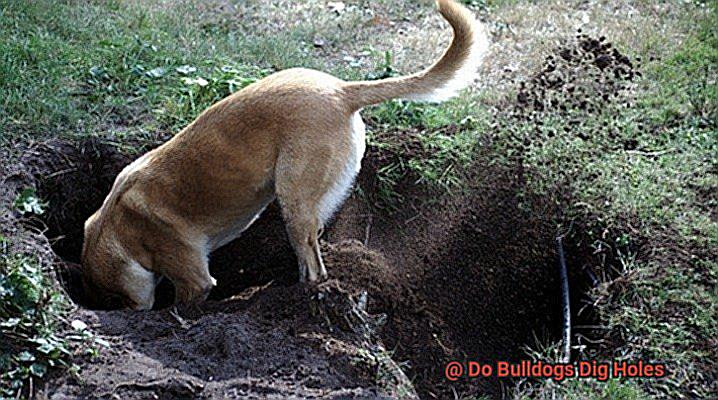Do Bulldogs Dig Holes?
Bulldogs, those lovable and charming creatures with their unique appearance, have captured the hearts of many. But here’s a question that has puzzled pet owners and enthusiasts alike: do Bulldogs really have a knack for digging holes? Well, get ready to uncover the truth in this blog post.
Now, Bulldogs aren’t exactly known as the poster dogs for digging. But let me tell you, they’ve got some surprising skills when it comes to excavation. Understanding why Bulldogs dig is crucial if you want to effectively manage this behavior.
So, why do Bulldogs dig? It all goes back to their ancestry. These dogs were originally bred for bull-baiting, a sport that required grit and determination. That history has left its mark on them, inspiring occasional urges to dig like their ancestors who would unearth their opponents from the ground.
When Bulldogs do dig, they usually create shallow to moderate-sized holes. The reasons behind these excavations can vary – seeking relief from extreme weather conditions, fighting off boredom, hunting for buried treasures (like toys), or simply trying to create a cozy nest.
But here’s the thing – not all Bulldogs are equal in their digging enthusiasm. Age, gender, energy levels, and individual personality traits can all influence how often and how intensely your Bulldog digs.
Stay tuned because we’re about to dive deeper into the fascinating world of Bulldog digging habits. In the upcoming sections, we’ll explore what motivates this behavior, share strategies for managing excessive digging, and provide insightful tips to keep both your Bulldog’s instincts and your sanity in check. So grab a cup of coffee (or tea) and let’s get started.
The History of Bulldogs and Their Natural Instincts
Contents
- 1 The History of Bulldogs and Their Natural Instincts
- 2 Factors That Influence a Bulldog’s Tendency to Dig
- 3 Reasons Why Bulldogs May Dig Holes
- 4 How to Redirect a Bulldog’s Digging Instincts
- 5 Training Your Bulldog Not To Dig Unwanted Areas
- 6 Mental Stimulation and Physical Exercise for Bulldogs
- 7 Creating a Designated Digging Area in the Yard
- 8 Signs of Anxiety or Boredom in Dogs that May Lead to Excessive Digging
- 8.1 Restlessness and Pacing:
- 8.2 Excessive Barking:
- 8.3 Destructive Behavior:
- 8.4 Panting and Trembling:
- 8.5 Excessive Licking or Chewing:
- 8.6 Clinginess:
- 8.7 Prevention and Solutions:
- 8.8 Exercise and Mental Stimulation:
- 8.9 Consistent Routine:
- 8.10 Positive Reinforcement Training:
- 8.11 Seek Professional Help if Needed:
- 9 Conclusion
Bulldogs have a long history that dates back to ancient times. Originally bred for bull-baiting, a popular sport in medieval England, these dogs were known for their bravery and tenacity in taking down bulls. This required them to dig their teeth into the bull’s nose and hold on until the bull was subdued. However, with the banning of bull-baiting in the 19th century, bulldogs faced an uncertain future. Luckily, they were saved from extinction by dedicated breed enthusiasts who transitioned them into companion dogs. Over time, their aggressive tendencies were bred out, and they became known for their gentle and friendly nature.
While bulldogs may not have a strong natural instinct for digging, there can be exceptions. Individual dogs may exhibit digging behavior due to factors such as boredom, anxiety, or a desire to escape from confinement. It’s important for owners to understand their bulldog’s unique personality and provide appropriate mental and physical stimulation to prevent any unwanted digging behavior.
Despite their history as working dogs, modern Bulldogs are not typically inclined to dig holes. Their breeding has focused more on their temperament and physical appearance rather than their working abilities. As a result, bulldogs today are more likely to be found lounging on the couch rather than engaging in any digging activities.
It’s worth noting that bulldogs have a unique body structure that may make digging challenging for them. Their short legs and muscular bodies are not ideally suited for extensive digging. This physical limitation further reinforces the idea that bulldogs are not natural diggers.
So, if you have a French Bulldog or any other type of bulldog breed, you don’t need to worry too much about them transforming your backyard into a construction site. However, it’s still important to provide your bulldog with regular exercise and mental stimulation to keep them happy and healthy.
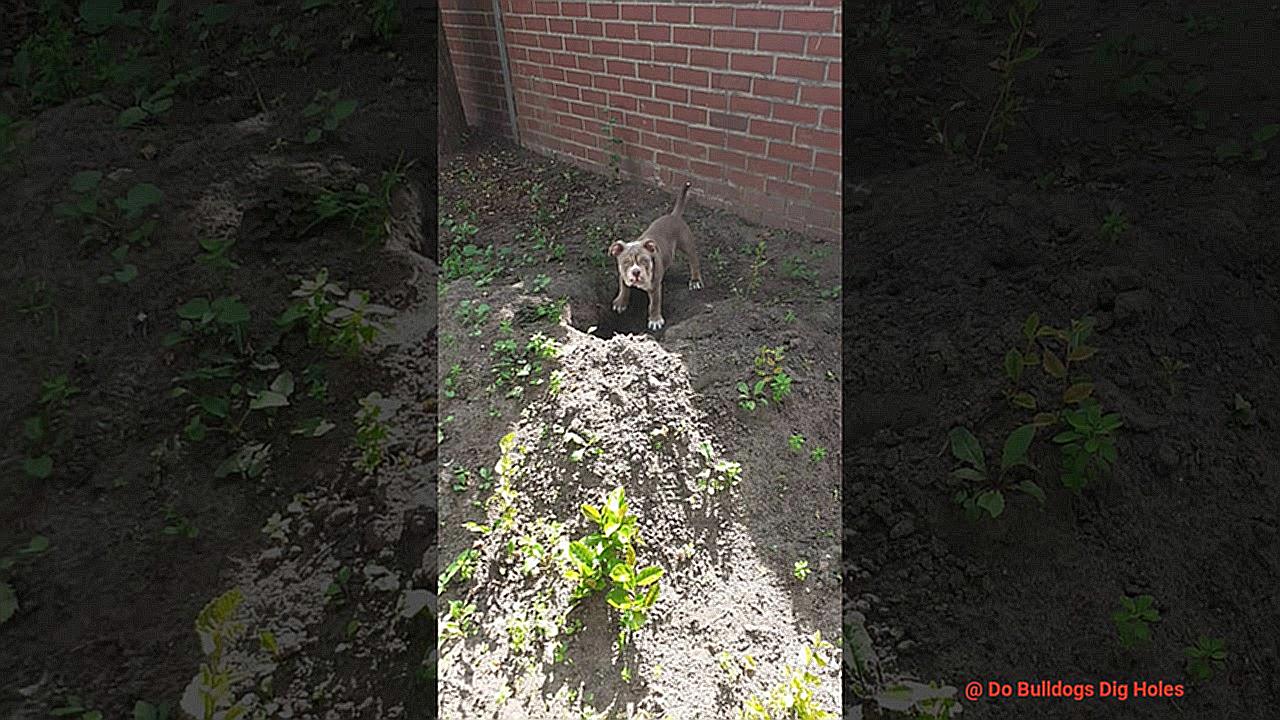
Here are some tips to prevent unwanted digging behavior in bulldogs:
- Regular Exercise: Engage your bulldog in regular walks and play sessions to help channel their energy in a positive way.
- Mental Stimulation: Provide puzzle toys and interactive games to keep your bulldog’s mind engaged and prevent boredom.
- Designated Digging Area: Create a specific spot in your yard with loose soil or sand where your bulldog can dig to satisfy their natural instincts without causing damage elsewhere.
- Training and Positive Reinforcement: Consistency and positive reinforcement are key when training your bulldog not to dig. Reward good behavior and redirect them away from digging sites.
- Address Underlying Issues: Excessive digging may be a sign of anxiety or boredom. Consult with a veterinarian or professional dog trainer if you suspect these issues.
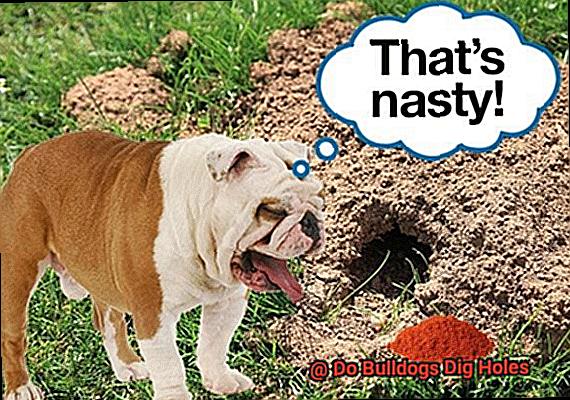
Factors That Influence a Bulldog’s Tendency to Dig
French Bulldogs are beloved pets known for their adorable appearance and friendly personalities. However, like their Bulldog ancestors, they still possess a natural instinct to dig. In this blog post, we will delve into the factors that influence a French Bulldog’s tendency to dig, helping you understand this behavior and provide appropriate outlets for their energy.
Genetics and Breed Characteristics:
French Bulldogs share their lineage with Bulldogs, which were originally bred for bull-baiting. This history has left them with a predisposition for digging. Their muscular bodies and strong jaws give them the ability to dig efficiently. Additionally, their compact size makes them agile and capable of maneuvering in various terrains.
Environmental Factors:
The environment in which your French Bulldog lives plays a crucial role in their digging tendencies. If they are confined to a small yard without much mental or physical stimulation, they may resort to digging as a way to alleviate boredom or excess energy. Providing ample exercise opportunities, interactive toys, and regular walks can significantly reduce their need to dig.
Individual Personality Traits:
Each French Bulldog has its own unique personality traits that can influence their propensity to dig. Some may have a higher level of curiosity or independence, driving them to explore and dig more frequently. On the other hand, others may have a more laid-back temperament and exhibit less digging behavior.
Managing Digging Behavior:
Understanding the underlying factors can help you manage your French Bulldog’s digging behavior effectively:
- Provide mental and physical stimulation: Engage your French Bulldog in regular exercise routines, interactive toys, and obedience training to keep them mentally stimulated and physically exhausted.
- Create a designated digging area: Set up a specific area in your yard where your French Bulldog is allowed to dig freely. Use sand or soft soil to make it more appealing, and encourage them to dig in that area through positive reinforcement.
- Utilize positive reinforcement techniques: Reward your French Bulldog for appropriate behavior and redirect their digging instincts towards more suitable activities, such as playing with puzzle toys or participating in scent work.
Conclusion:
French Bulldogs may have a natural inclination to dig due to their genetics, breed characteristics, environmental factors, and individual personalities. By understanding these influences and providing appropriate outlets for their energy and stimulation, you can minimize excessive digging behavior. Remember to be patient, consistent, and use positive reinforcement techniques to shape their behavior effectively.
Reasons Why Bulldogs May Dig Holes
Bulldogs are adorable and lovable pets, but sometimes they can surprise us with their quirky behaviors. One behavior that may leave you scratching your head is digging holes. Why do Bulldogs dig holes? Well, there are a few reasons why your furry friend may be engaging in this behavior.
Instinctual Behavior
Bulldogs have a natural instinct to dig. This behavior goes way back to their ancestors who used digging as a way to find shelter or hunt for prey. Even though Bulldogs no longer need to rely on these instincts for survival, the behavior may still be present in their DNA.
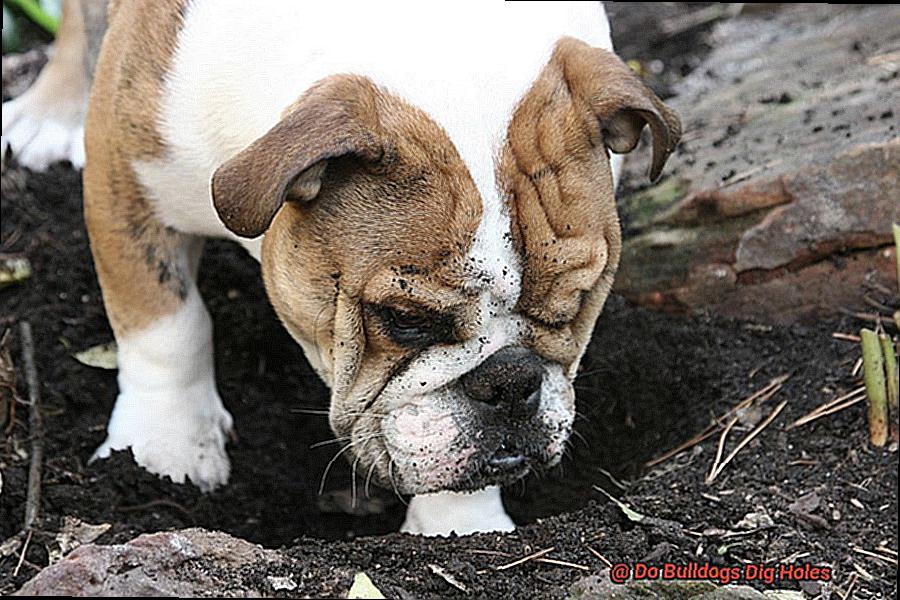
Boredom and Lack of Stimulation
Bulldogs may dig holes out of boredom. They may need more mental and physical stimulation to keep them entertained. If they don’t get enough exercise or playtime, they may resort to digging as a form of entertainment or to release pent-up energy.
Seeking Comfort
Bulldogs have a thick coat and can get hot easily. That’s why they may dig holes to find a cool spot in the ground to escape the heat during warm weather. Similarly, they may also dig holes in colder temperatures to create a warm and cozy place for themselves.
Escape Routes
Bulldogs are known for being escape artists, and digging can be one of their tricks. If a Bulldog feels trapped or confined, they may dig holes in an attempt to create an escape route or find a way out of their surroundings.
Hunting or Buried Treasures
Bulldogs may have a bit of their ancestors’ hunting instincts still in them. They might dig holes to search for small animals like rodents or insects that may be hiding underground. They also have a strong sense of smell and may dig in search of buried treasures or objects that catch their interest.
How to Redirect a Bulldog’s Digging Instincts
Absolutely. Bulldogs, including French Bulldogs, have a natural instinct to dig. It’s in their genes. You see, Bulldogs were historically bred for bull-baiting and ratting, activities that involved digging and burrowing. So, it’s no surprise that some Bulldogs still enjoy digging up the yard today.
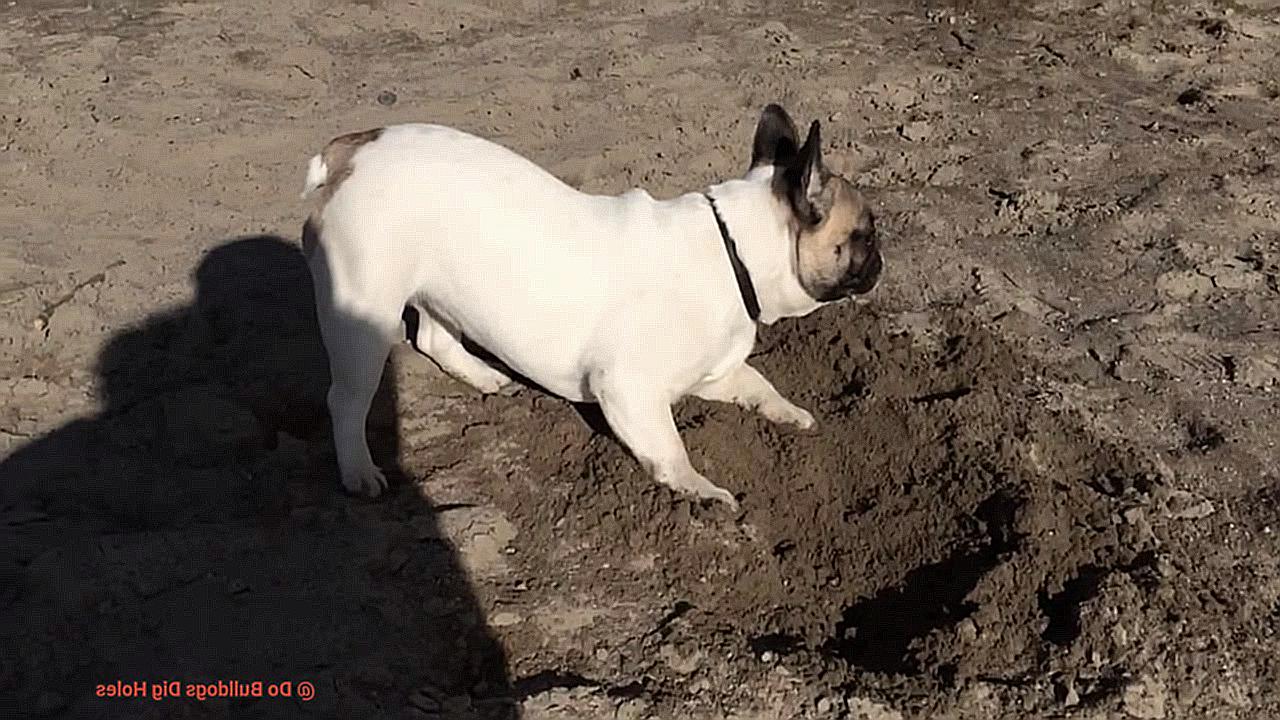
But why do Bulldogs dig holes? Well, there are a few reasons. Young Bulldogs, especially puppies, are more likely to engage in digging behavior as they explore their surroundings and expend their excess energy. Bulldogs may also dig holes to find cool spots during hot weather or to escape from confinement. And sometimes, they simply dig out of boredom. So, how can you redirect their digging instincts?
First things first, provide your Bulldog with plenty of mental and physical stimulation. These active little guys need regular exercise to tire them out and reduce their urge to dig. Take them on daily walks or engage in playtime to keep them entertained.
Interactive toys and puzzle feeders are also great for stimulating their minds and preventing boredom. And don’t forget about obedience training. Teaching your Bulldog basic commands will not only keep their brains busy but also establish boundaries and reinforce good behavior.
Creating a designated digging area is another effective way to redirect your Bulldog’s digging instincts. Find a spot in your yard where it’s acceptable for them to dig, away from sensitive plants or structures. Use stakes or a small fence to mark the boundaries of this special area. Fill it with loose soil or sand, making it more appealing for your Bulldog to dig. You can even bury some toys or treats in the designated area to encourage them.
When you catch your Bulldog digging in an undesirable spot, don’t scold or punish them. Instead, calmly redirect their attention to a more appropriate activity or the designated digging area. Positive reinforcement is key. Reward them with treats or praise when they choose to dig in the right place. Consistency and patience are essential as it may take some time for them to understand what behavior is acceptable.
Training Your Bulldog Not To Dig Unwanted Areas
Bulldogs are adorable pets, but their natural instinct to dig can be a challenge for owners who want to maintain a pristine yard or garden. If you’re tired of finding holes in your lawn or upturned flower beds, don’t worry – there are effective ways to train your bulldog not to dig in unwanted areas. As an expert in bulldog training, I’ve seen firsthand how consistency and positive reinforcement can make a world of difference. Let’s dive into some practical tips and techniques that will help you tackle this issue head-on.
- Provide a designated digging spot: Bulldogs have an innate need to dig, so it’s essential to redirect their digging instincts to a specific area. Create a sandbox or designate a part of your yard where they are allowed to dig freely. Fill it with loose soil or sand, and bury some toys or treats to make it enticing for them.
- Reward desired behavior: Whenever you catch your bulldog digging in the designated spot, shower them with praise and rewards. Positive reinforcement is key in training any dog, and bulldogs are no exception. Treats, belly rubs, and enthusiastic verbal cues like “Good job.” will reinforce that digging in the designated area is the right thing to do.
- Redirection and commands: When you notice your bulldog digging in unwanted areas, firmly say “no” or “stop.” Immediately redirect their attention to another activity or toy that they enjoy. This will help them understand that digging in those particular spots is off-limits.
- Make unwanted areas less attractive: Bulldogs are smart dogs, but they can also be easily deterred. Place rocks or chicken wire over the areas you want to protect. This makes it more challenging for them to dig and less appealing overall. You can also use deterrent sprays with unpleasant tastes or smells on surfaces you want to keep intact.
Remember, consistency is crucial throughout this training process. Bulldogs need repetition and reinforcement to understand what is expected of them. It’s also important to be patient because digging is a natural behavior for them. With time and dedication, your bulldog will learn to respect your designated areas and leave your precious garden undisturbed.
If despite your best efforts, your bulldog continues to dig in unwanted areas, consider seeking professional help from a dog trainer or behaviorist. They can provide personalized guidance and support to address any underlying issues that may be causing the digging behavior.
Mental Stimulation and Physical Exercise for Bulldogs
Bulldogs are beloved for their unique appearance and lovable personalities. However, beneath their adorable exterior lies a breed that requires mental stimulation and physical exercise to flourish. In this blog post, we will explore the importance of these activities for Bulldogs and provide expert tips to keep your furry friend happy and healthy.
Mental Stimulation for Bulldogs
Puzzle Toys: Challenge their Minds
- Introduce puzzle toys that require problem-solving skills to access hidden treats or toys.
- Engages their intelligent minds while preventing boredom and destructive behavior.
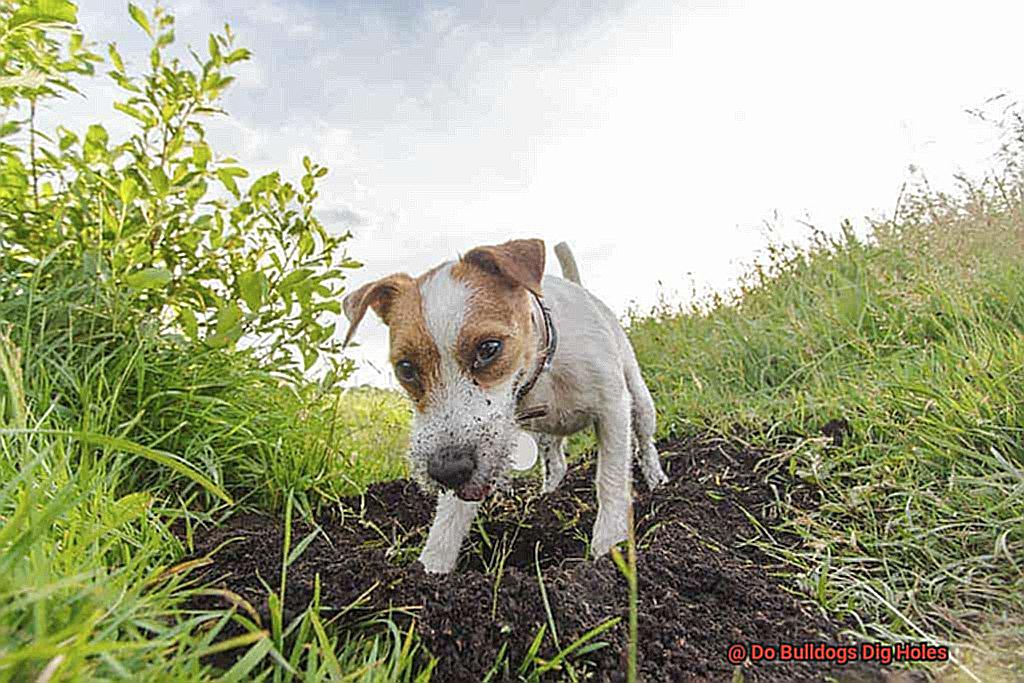
Training Sessions: Strengthen the Bond
- Bulldogs are intelligent and eager to please, making obedience training highly beneficial.
- Teach basic commands using positive reinforcement to stimulate their minds and establish a strong bond with their owners.
Physical Exercise for Bulldogs
Daily Walks: Keeping Fit
- Bulldogs may not have high endurance, but regular walks are crucial to burn off energy and maintain muscle tone.
- Choose a brisk walk around the neighborhood or a visit to the local park for physical exertion.
Swimming: Low-Impact Fun
- Swimming is a gentle yet effective full-body workout for Bulldogs, perfect for their joints.
- Introduce them to water gradually and supervise them at all times during swimming sessions.
Playtime with Their Owners
Interactive Games: Bonding and Exercising
- Engage in tug-of-war, fetch, or interactive games that allow Bulldogs to burn energy while bonding with their human companions.
- Choose sturdy toys that can withstand their strong jaws to prevent accidental injuries.
Creating a Designated Digging Area in the Yard
If you’ve ever caught your Bulldog with dirt on their paws and a mischievous look in their eyes, you know exactly what it means – digging time. Bulldogs have a natural instinct to dig, and it can be a challenge to redirect their digging tendencies. But fear not. We’ve got the paw-fect solution for you – creating a designated digging area in your yard.
Choosing the ideal spot for this Bulldog oasis is crucial. Look for an area that’s shady, away from delicate plants or structures. Bulldogs love to dig for cool spots, so keep that in mind when selecting the location. Once you’ve found the perfect spot, it’s time to roll up your sleeves and get down to business.
Prepare the area by removing any rocks or debris that could be uncomfortable or dangerous for your furry friend. Bulldogs have sensitive paws, and we want their digging experience to be as enjoyable as possible. Loosen up the soil and add some sand or soft dirt to make it more appealing. Think of it as creating a spa-like experience for your Bulldog.
Now comes the fun part – introducing your Bulldog to their new digging haven. Encourage them to explore by burying some toys or treats in the area. Bulldogs love surprises, so this will definitely catch their attention. And when they start digging like there’s no tomorrow, shower them with praise and treats. Positive reinforcement is the name of the game.
But remember, consistency is key. Bulldogs may need a little extra guidance to fully understand that this is their designated digging spot. So whenever you catch your Bulldog attempting to dig up the rest of your yard, gently redirect them to their special area and reward them for using it. With time and patience, they’ll get the hang of it.
To really keep those digging desires at bay, provide alternative forms of enrichment for your Bulldog. Puzzle toys and interactive games are paw-some ways to redirect their energy and keep their minds sharp. Plus, it’s a great bonding opportunity for you and your furry friend.
Of course, let’s not forget the importance of regular exercise and mental stimulation for Bulldogs. A tired Bulldog is a happy Bulldog, so make sure to give them plenty of physical activity and playtime. Whether it’s a long walk or a swimming session, find what gets their tail wagging and make it a part of their daily routine.
And if, despite all your efforts, your Bulldog is still digging up unwanted areas, it may be worth seeking professional help from a dog trainer or behaviorist. They can provide tailored guidance and advice to address your Bulldog’s specific needs.
Signs of Anxiety or Boredom in Dogs that May Lead to Excessive Digging
French Bulldogs, with their irresistible charm and lovable personalities, can sometimes fall prey to anxiety or boredom. If left unchecked, these emotions can manifest in excessive digging. As an expert in canine behavior, I’d like to share with you the telltale signs of anxiety or boredom in Bulldogs that may lead to this behavior.
Restlessness and Pacing:
An anxious or bored Bulldog may exhibit restlessness by pacing back and forth. This constant movement is a clear indication that they’re feeling uneasy or unstimulated.
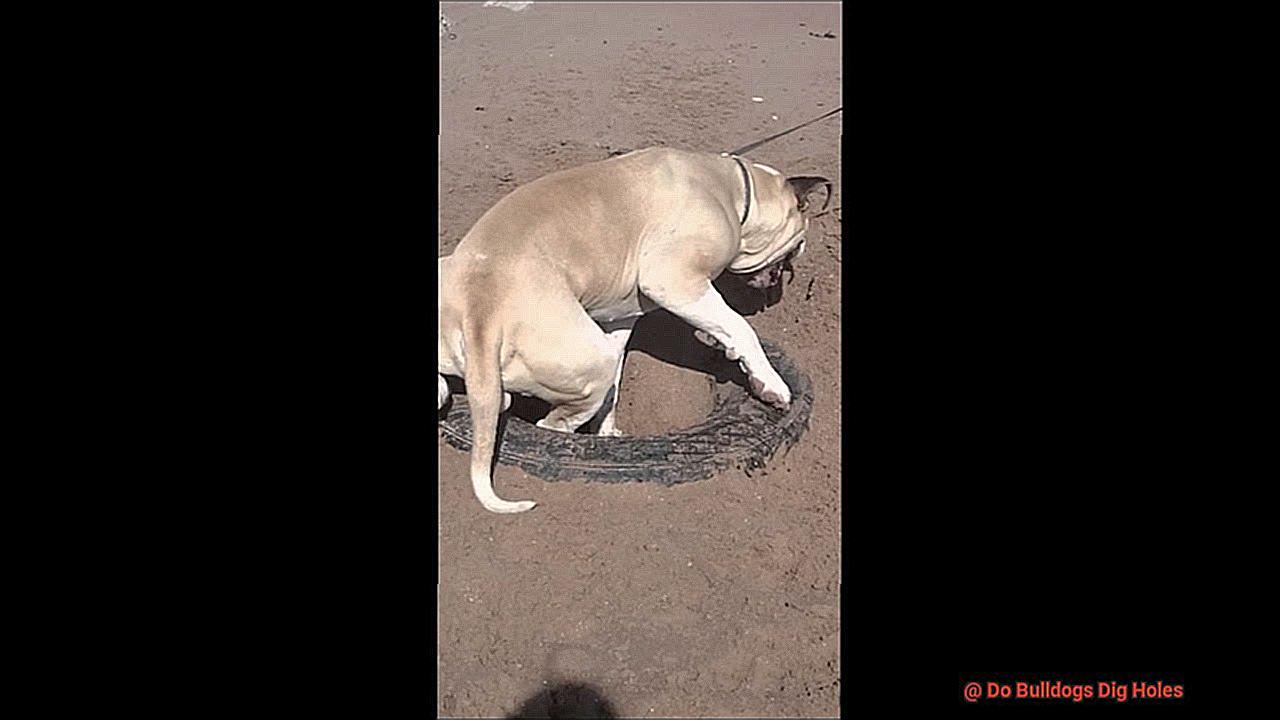
Excessive Barking:
In their quest for attention or an outlet for pent-up energy, Bulldogs may resort to excessive barking. This vocalization is often a cry for help, a sign that they’re not getting the mental or physical stimulation they need.
Destructive Behavior:
Digging is just one form of destructive behavior that can result from anxiety or boredom. Bulldogs may also chew on furniture, scratch doors, or tear up household items when feeling neglected or understimulated.
Panting and Trembling:
If your Bulldog pants excessively or trembles in situations that don’t typically trigger these responses (such as warm weather), it may indicate underlying anxiety. These physical signs are their way of expressing unease.
Excessive Licking or Chewing:
Bulldogs may resort to excessive licking or chewing as a coping mechanism for anxiety or boredom. Pay attention if you notice them constantly licking their paws, chewing on furniture, or gnawing at themselves—these behaviors can be signs of deeper issues.
Clinginess:
When Bulldogs feel anxious or bored, they often seek comfort and attention from their owners. They become clingy and demand constant affection as a way to alleviate their emotional distress.
Prevention and Solutions:
To tackle anxiety or boredom-related digging, it’s important to address the root causes. Here are some strategies to consider:
Exercise and Mental Stimulation:
Ensure your Bulldog gets enough physical exercise and mental stimulation. Regular walks, playtime, and interactive toys can help tire them out and keep their minds engaged.
Consistent Routine:
Establish a consistent daily routine that includes exercise, feeding times, and designated play sessions. Bulldogs thrive on structure, so sticking to a predictable schedule can help alleviate anxiety and prevent boredom.
Positive Reinforcement Training:
Use positive reinforcement training techniques to redirect your Bulldog’s energy towards more appropriate behaviors. Reward them for good behavior and provide mental challenges to keep their minds occupied.
Seek Professional Help if Needed:
If anxiety or boredom-related digging persists despite your best efforts, consider seeking guidance from a veterinarian or professional dog trainer. They can provide personalized advice and support tailored to your Bulldog’s specific needs.
GGYlTub_Q7c” >
Conclusion
In conclusion, it is evident that Bulldogs do indeed have a propensity for digging holes. This characteristic can be attributed to their history as working dogs, where they were bred to dig and burrow. Despite their stocky build and seemingly docile demeanor, Bulldogs possess an innate instinct to excavate the earth beneath them.
From playful puppies to mature adults, Bulldogs display an unwavering determination when it comes to digging. Their powerful front legs and muscular bodies enable them to effortlessly break through the soil, leaving behind impressive craters in their wake. Whether it’s chasing after a buried treasure or simply seeking relief from the heat by creating a cool spot to lie in, Bulldogs find solace in their excavation endeavors.
However, it is important for Bulldog owners to address this behavior appropriately. While digging may be instinctual for these lovable creatures, it can also become destructive if left unchecked. Providing designated digging areas or engaging them in mentally stimulating activities can help redirect their energy and prevent them from turning your backyard into a lunar landscape.
So next time you see your Bulldog enthusiastically plunging its paws into the ground, remember that this is merely an expression of its natural instincts. Embrace their unique quirks and channel their enthusiasm towards constructive outlets.
